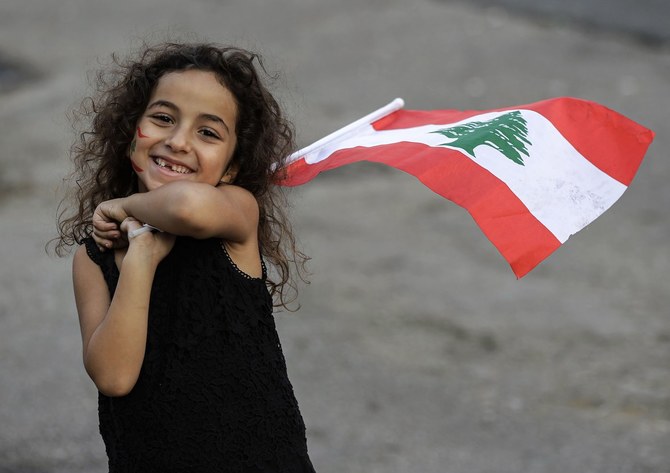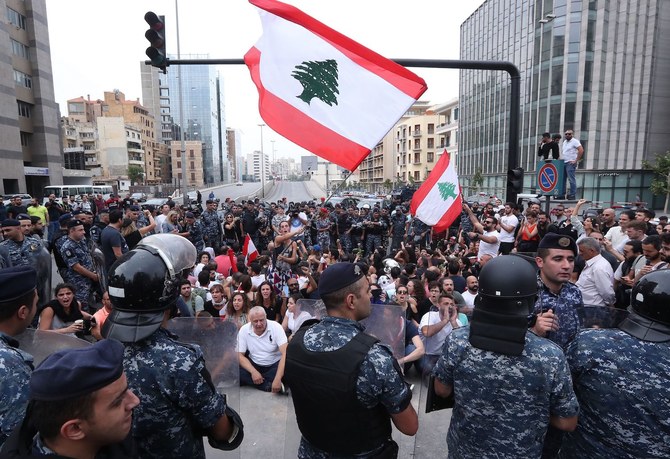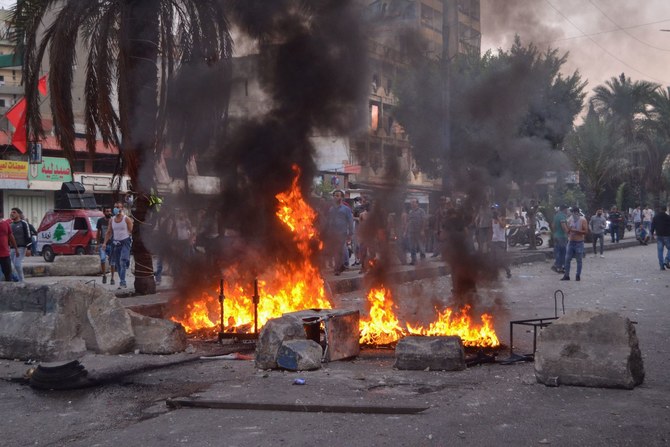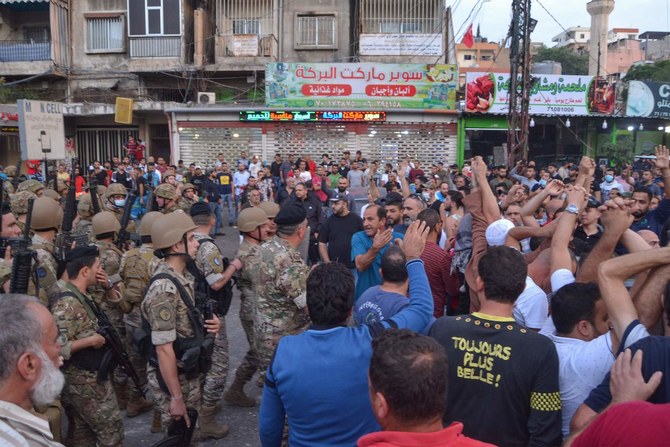BEIRUT: Lebanese security forces pushed and dragged away protesters who refused to move from roadblocks in central Beirut on Saturday, to reopen roads closed during a campaign of civil disobedience.
The protesters had set up several roadblocks around Beirut and on major highways to enforce their calls for the government to step down amid nationwide protests, now in their tenth day.
When the riot police moved in to clear the roadblocks on the ring road that links eastern and western Beirut, many protesters sat or lay down on the asphalt in defiance.
Some protesters chanted: “The people want to bring down the regime.”

A riot police armoured vehicle removes a concrete block used by demonstrators to block a highway, during ongoing anti-government protests in downtown Beirut on October 26, 2019. (Reuters)
“We are no bandits,” cried one man. “We have rights and are asking for them.”
Pushing and shoving, the security forces successfully opened the road and traffic flowed through. In another part of Lebanon, the army removed a roadblock without incident.
But on the coastal highway to the north, a large crowd of residents sat on the ground and others stood in one line, blocking the military’s efforts to remove the roadblocks with a bulldozer. The military retreated.
The military warned that blocking roads was in violation of the law. The head of Lebanon’s powerful militant Hezbollah group, Hassan Nasrallah, called on protesters to open the roads in a speech Friday.

Members of the Lebanese security forces surround protesters blocking a major bridge in the centre of the capital Beirut, during an anti-government protest on October 26, 2019. (AFP)
The Lebanese army said it fired gunshots into the air after a clash at a protest road-block near the northern city of Tripoli on Saturday, injuring several people.
The army said it had intervened to break up a skirmish between protesters and people trying to drive their cars on the road. Stones and fireworks were thrown at soldiers, injuring five of them, it said in a statement.
After using tear gas, the army said it then fired into the air and also used rubber bullets, injuring several people.
A witness said soldiers shot into the air after trying to re-open a road out of Tripoli that some protesters had been blocking, near the Beddawi Palestinian refugee camp.
As part of a wave of unprecedented protests demanding the government resign, people have closed routes across Lebanon with makeshift barriers and sit-ins for days.

Lebanese anti-government protesters stand behind a burning barricade during a demonstration in Beddawi town on the outskirts of Tripoli on October 26, 2019. (AFP)
The protests have paralyzed the country, which already faces a major economic crisis. Banks, universities and schools have been closed since last week.
But the unprecedented demonstrations have also brought together Lebanese from all sects and political affiliation, uniting them in a common demand that long-serving politicians, accused of corruption and mismanagement, step down.
Squares in Beirut and other cities have filled up in a spontaneous expression of anger at the country’s political elite. A common chant, “All means all,” has demanded all incumbent officials step down.
Nasrallah ordered his supporters to leave the protests on Friday after they clashed with anti-government protesters who criticized him. The Hezbollah leader tried to cast doubt on the spontaneity of the protests, saying that foreign powers and rivals are trying to exploit the rallies for political gains against his group.
Just before the security forces moved in on Saturday, two women and two men were manning the roadblock on the ring road. They said they have been at the roadblock for 10 days and have no plan to dismantle it but added that they would not fight the army. They let through an ambulance and a motorcycle.

Anti-government protesters shout slogans as they block a main highway, in Beirut, Lebanon, Saturday, Oct. 26, 2019. (AP)
“This is an uprising of a people who have been suffering for the last 30 years and can no longer tolerate their lies, theft and hypocrisy,” said 29-year-old Rima, who was manning the roadblock, referring to the government. “We are protesting. We are not vandalizing or violent.” Rima declined to give her last name, worried about her safety.
To the south, Lebanese soldiers removed chairs and tents set up in the middle of the intersection that links Beirut to the presidential palace, the mountain overlooking the city, the east and suburbs of Beirut.
The protesters did not resist but one broke into tears, telling the local LBC television station that he was disappointed the army had to force them to remove the roadblocks.
Amnesty International has said that blocking the roads was part of the protesters’ efforts to make their voice heard, and called on authorities to protect the rallies against violence from political opponents.




































